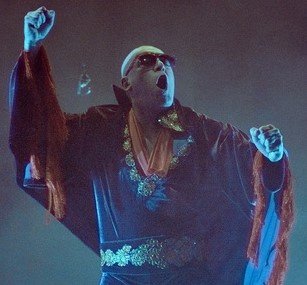An impassioned Luther (Kinevane) engages in tango mode with the demons of his past and present in KING, a solo play he wrote, produced by Fishamble: The New Play Company.
In Ireland’s County Cork there are apparently many ghosts. Nasty ghosts. KING (an acronym for Keep Ignoring Nasty Ghosts) posits that ghosts of the past have a central role in the way we live our present—and future. Fishamble, a Dublin-based theater showcase for new Irish plays, has produced this work, which features a solo performance by Pat Kinevane, a veteran associate of the company. Director Jim Cullerton has shaped it into a powerful but enigmatic and often disturbing reflection on obsession, mental illness, England’s domination of Ireland and its empire, and one man’s attempt to grapple with a litany of wrongs, both past and present.
Kinevane, who plays Luther, a mentally ill, middle-aged, bereft man living on disability, is a force to be reckoned with. Tall and of sturdy build, he is incredibly lithe. Yet one senses that, notwithstanding the ravages of his illness, Luther’s dominant emotion is rage—and there is plenty of it. Regardless of whether voices from the 1800s that he hears are truly ghosts of an Ireland whose starving inhabitants rail at British repression, or delusions symptomatic of his psychosis, they anger him. He lashes out at the injustices of Britain’s colonial rule and its impact on subjugated peoples, at the Royal Family, at an abusive father and grandfather, at people at the pharmacy who mocked him, and the women who turned him down.
Luther contemplates the mental balancing act that is his life. Photographs by Maurice Gunning.
Luther is also passionate about people who have been kind and protective of him, like his long-gone granny, and appreciative of little kindnesses, like those of Indira at the pharmacy, who dispenses his medicines.
Luther’s illness and obsessions belie his abilities as a dancer and his side hustle as an Elvis impersonator. Stylist Catherine Condell out-Elvises Elvis with Luther’s gaudy purple velvet jumpsuit and a shimmering, red-trimmed androgynous wrap; the latter also provides the perfect garb for Luther’s passionate tango. In his tango mode, Luther, enraptured in this wrap (allegedly left behind by a helpful woman) is not just miming a couple swaying passionately, or writhing on the floor, but working through his emotional pain so as to release it:
Every Friday night prize filling the cabinet with silver and crystal. By way of the Argentine tango—the only dance in the world where lovers or strangers can literally dance heartbeat-to-heartbeat.
In more lucid moments, and there aren’t many of them, Luther wonders if he can subsist on his disability check and still maintain his home alone, and if he is appealing to women. In positive moments, and there aren’t many of those, either, Luther relives, again and again, his grandmother’s voice, her courage in standing up against a patriarchal system, her love for him, and his gratitude for what she taught him, such as ironing. Repetitive ironing moments seem to focus and somewhat calm his disjointed thinking, even if he uses them to expound on some pet peeve.
Luther revs up for his Elvis impersonation act.
Luther occasionally questions audience members as to whether his actions are justifiable. His interactions with them seem more rhetorical in reinforcing his position, rather than truly seeking their advice. He goes from the giddiness and self-doubt one attributes to a teenager to frustration over his canceled Elvis gig, but moving right along, he flips the personality switch to a tango tryst.
Kinevane is a remarkable actor. His dark—very dark—play conveys an environment tainted with suffering, blood, and unfulfilled fantasies, and in which retreating into mental illness may be the better of two not very good options for Luther. Pius McGrath’s lighting complements this environment and Luther’s mental gymnastics to keep from going down the rabbit hole of just not taking his meds and simply giving up. The play is replete with ghosts of brutally broken hearts, tormented voices from centuries past, empathetic identification of the Irish with other persecuted groups, and the realities faced by those who must daily cope with the demons of their minds. One wonders if at least part of the rationale for the play is to demystify mental illness and engender empathy for those enmeshed in its grasp.
Fishamble: The New Play Company’s KING runs through April 14 at 59E59 Theaters. Evening performances are at 7:15 p.m. Tuesday through Friday. Matinees are at 2:15 p.m. Saturday and Sunday. For more information, or to purchase tickets, call the box office at (646) 892-7999 or email boxoffice@59e59.org, or visit 59e59.org/shows.
Writer: Pat Kinevane
Director: Jim Culleton
Composer & Sound Designer: Denis Clohessy
Lighting Designer/Production Stage Manager: Pius McGrath
Stylist: Catherine Condell
Makeup Artist: Zoe Clarke
Choreographers: Kristina Chaloir & Julian Brigatti





